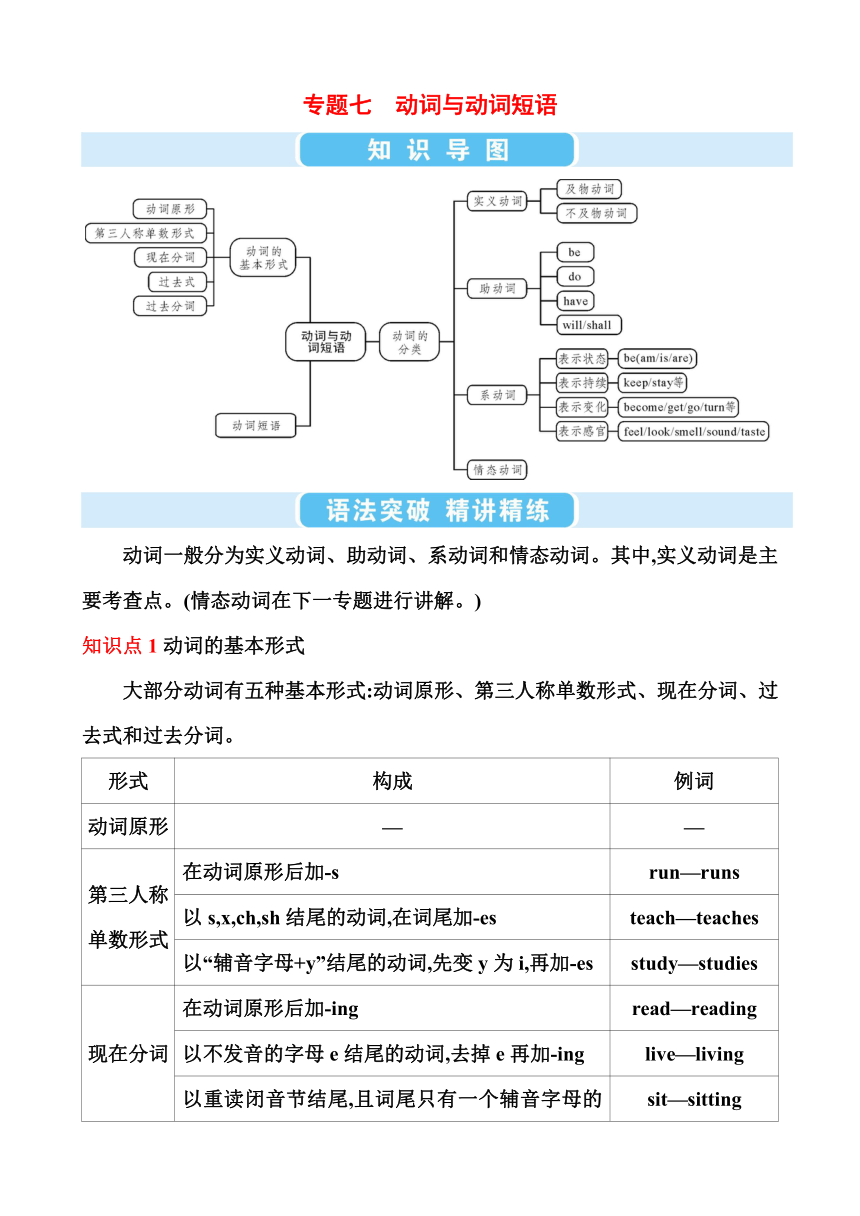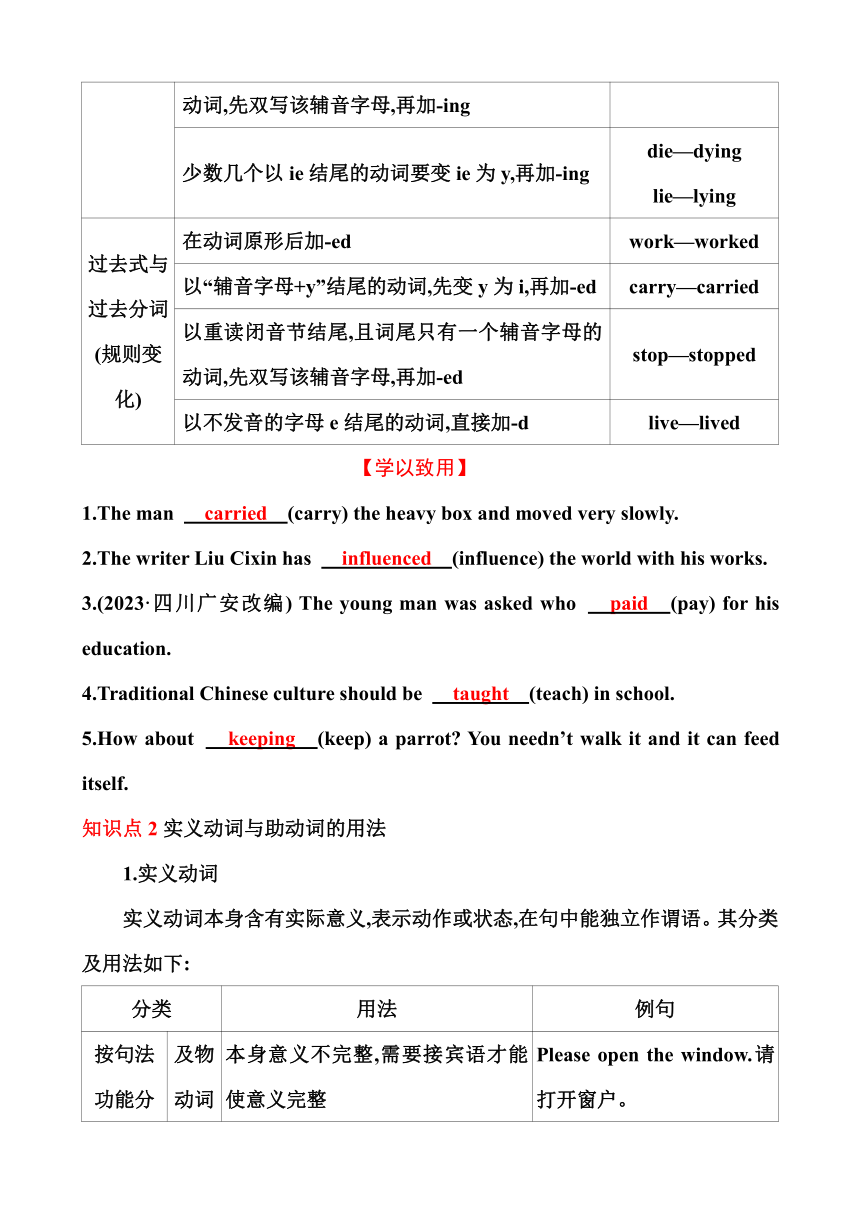07 专题七 动词与动词短语 学案 2025年中考英语语法精讲(人教版)
文档属性
| 名称 | 07 专题七 动词与动词短语 学案 2025年中考英语语法精讲(人教版) |

|
|
| 格式 | docx | ||
| 文件大小 | 121.9KB | ||
| 资源类型 | 教案 | ||
| 版本资源 | 人教新目标(Go for it)版 | ||
| 科目 | 英语 | ||
| 更新时间 | 2024-12-17 10:42:54 | ||
图片预览



文档简介
专题七 动词与动词短语
动词一般分为实义动词、助动词、系动词和情态动词。其中,实义动词是主要考查点。(情态动词在下一专题进行讲解。)
知识点1动词的基本形式
大部分动词有五种基本形式:动词原形、第三人称单数形式、现在分词、过去式和过去分词。
形式 构成 例词
动词原形 — —
第三人称 单数形式 在动词原形后加-s run—runs
以s,x,ch,sh结尾的动词,在词尾加-es teach—teaches
以“辅音字母+y”结尾的动词,先变y为i,再加-es study—studies
现在分词 在动词原形后加-ing read—reading
以不发音的字母e结尾的动词,去掉e再加-ing live—living
以重读闭音节结尾,且词尾只有一个辅音字母的动词,先双写该辅音字母,再加-ing sit—sitting
少数几个以ie结尾的动词要变ie为y,再加-ing die—dying lie—lying
过去式与 过去分词 (规则变化) 在动词原形后加-ed work—worked
以“辅音字母+y”结尾的动词,先变y为i,再加-ed carry—carried
以重读闭音节结尾,且词尾只有一个辅音字母的动词,先双写该辅音字母,再加-ed stop—stopped
以不发音的字母e结尾的动词,直接加-d live—lived
【学以致用】
1.The man carried (carry) the heavy box and moved very slowly.
2.The writer Liu Cixin has influenced (influence) the world with his works.
3.(2023·四川广安改编) The young man was asked who paid (pay) for his education.
4.Traditional Chinese culture should be taught (teach) in school.
5.How about keeping (keep) a parrot You needn’t walk it and it can feed itself.
知识点2实义动词与助动词的用法
1.实义动词
实义动词本身含有实际意义,表示动作或状态,在句中能独立作谓语。其分类及用法如下:
分类 用法 例句
按句法 功能分 及物 动词 本身意义不完整,需要接宾语才能使意义完整 Please open the window.请打开窗户。
不及物 动词 本身意义完整,无需接宾语,若不及物动词要接宾语,其后需加适当的介词 He works hard.他努力工作。 I like listening to music.我喜欢听音乐。
按动作 发生的 方式、 发生过 程的长 短分 延续性 动词 表示能够延续的动作,如:learn,work,keep,sleep,live等,可以与表示时间段的状语(for+时间段,since+时间点,since从句)连用 I have lived here for five years. 我在这儿住了五年了。
非延续 性动词 也称瞬间动词,表示不能延续的动作,动作发生后立即结束,如:open,die,begin,finish,come,borrow,lend,buy等,不能与表示时间段的状语连用 I borrowed a book from the library yesterday.我昨天从图书馆借了一本书。
2.助动词
(1)助动词不能独立作谓语,只能和主要动词(主要是实义动词)一起构成谓语,体现否定、疑问、时态、语态等语法形式。常见的助动词有be,do,have,will/shall等,具体用法如下:
助动词 功能 例句
be 构成现在进行时:am/is/are+现在分词 I am listening to music.我正在听音乐。
构成过去进行时:was/were+现在分词 I was taking a shower at 8:00 last night. 昨晚八点我正在洗澡。
构成一般将来时:am/is/are+going to+动词原形 They are going to have a trip next month. 下个月他们将要去旅行。
构成被动语态:be(am/is/are/was/were)+过去分词 Many trees are planted every year.每年种很多树。
(续表)
助动词 功能 例句
do 构成疑问句、否定句。 注:一般现在时中用do,does(第三人称单数形式),一般过去时中用did Do you like reading 你喜欢阅读吗 He didn’t go to school yesterday.他昨天没有去上学。
have 构成现在完成时:have/has+过去分词 I have taught English in the school for three years. 我已在这所学校教了三年英语了。
will/ shall 构成一般将来时:will/shall+动词原形 She will go to Beijing next Monday.下周一她将去北京。
(2)助动词在省略句中的运用
为了避免重复,一些句子常常省略(前面提到过的)谓语动词,而用相应的助动词代替此谓语动词,助动词要与句子的人称、时态一致。这种用法也常用于一般疑问句的简略回答中。如:
If you don’t go there,I won’t.如果你不去,我也不会去。
【学以致用】
用适当的助动词填空(注意否定形式)
1.I don’t have a basketball,but my friend David does .
2.In England,tea didn’t appear until around 1660.
3.This is the most interesting book I have ever read.
4.A baby’s first-month birthday is a special event in China and is celebrated with a special party.
知识点3系动词的用法
系动词用于连接主语和表语,表示主语的身份、性质和状态等。系动词不能单独作谓语,后面必须跟形容词、名词或介词短语等作表语。
【学以致用】
1.(2023·河南) So next time,when you feel thankful,express your thanks bravely.
2.When the traffic lights turn red,stop crossing the street.
3.Throw away the food that has gone bad.
4.Days get longer and longer after the summer solstice(夏至).
5.(2023·湖北咸宁改编) Although the food tastes bad,it’s good for our health.
知识点4动词短语
动词短语是指动词跟介词或副词等构成的固定短语。常见分类如下:
1.动词+介词
在此类动词短语中,宾语(名词或代词宾格)只能位于介词后面。如arrive at/in,ask for,come from,get to,laugh at,listen to,look after,wait for等。
2.动词+副词
在此类动词短语中,宾语为代词(宾格)时,只能位于动词和副词之间;宾语为名词时,位于副词前后均可。如find out、give up、put off、turn on、think over等。
3.动词+副词+介词
在此类动词短语中,宾语(名词或代词宾格)只能位于介词后面。如come up with、get on/along with、go on with、look forward to等。
4.动词+名词+介词
在此类动词短语中,名词之前可加形容词来修饰,宾语(名词或代词宾格)只能位于介词后面。如make friends with、make use of、pay attention to、take part in、take care of等。
【学以致用】
1.More and more people love _______how rich they are on this app(小红书).
A.showing off B.turning on
C.giving off D.getting off
2.Because of the weather,the school _______the sports meeting for a week.
A.put up B.put away
C.put off D.put in
3.(2023·湖北武汉二调)—How’s he _______the whole thing
—He has made some research,done some surveys and asked for a lot of support.
A.thinking about B.looking up
C.learning from D.dealing with
4.We don’t sell these old books.We’d like to _______to kids in need.
A.give them up B.give them away
C.give away them D.give up them
5.—What’s your plan for tomorrow
—My passport _______next month.I must get it renewed(换新).
A.uses up B.runs out
C.goes up D.sets out
动词一般分为实义动词、助动词、系动词和情态动词。其中,实义动词是主要考查点。(情态动词在下一专题进行讲解。)
知识点1动词的基本形式
大部分动词有五种基本形式:动词原形、第三人称单数形式、现在分词、过去式和过去分词。
形式 构成 例词
动词原形 — —
第三人称 单数形式 在动词原形后加-s run—runs
以s,x,ch,sh结尾的动词,在词尾加-es teach—teaches
以“辅音字母+y”结尾的动词,先变y为i,再加-es study—studies
现在分词 在动词原形后加-ing read—reading
以不发音的字母e结尾的动词,去掉e再加-ing live—living
以重读闭音节结尾,且词尾只有一个辅音字母的动词,先双写该辅音字母,再加-ing sit—sitting
少数几个以ie结尾的动词要变ie为y,再加-ing die—dying lie—lying
过去式与 过去分词 (规则变化) 在动词原形后加-ed work—worked
以“辅音字母+y”结尾的动词,先变y为i,再加-ed carry—carried
以重读闭音节结尾,且词尾只有一个辅音字母的动词,先双写该辅音字母,再加-ed stop—stopped
以不发音的字母e结尾的动词,直接加-d live—lived
【学以致用】
1.The man carried (carry) the heavy box and moved very slowly.
2.The writer Liu Cixin has influenced (influence) the world with his works.
3.(2023·四川广安改编) The young man was asked who paid (pay) for his education.
4.Traditional Chinese culture should be taught (teach) in school.
5.How about keeping (keep) a parrot You needn’t walk it and it can feed itself.
知识点2实义动词与助动词的用法
1.实义动词
实义动词本身含有实际意义,表示动作或状态,在句中能独立作谓语。其分类及用法如下:
分类 用法 例句
按句法 功能分 及物 动词 本身意义不完整,需要接宾语才能使意义完整 Please open the window.请打开窗户。
不及物 动词 本身意义完整,无需接宾语,若不及物动词要接宾语,其后需加适当的介词 He works hard.他努力工作。 I like listening to music.我喜欢听音乐。
按动作 发生的 方式、 发生过 程的长 短分 延续性 动词 表示能够延续的动作,如:learn,work,keep,sleep,live等,可以与表示时间段的状语(for+时间段,since+时间点,since从句)连用 I have lived here for five years. 我在这儿住了五年了。
非延续 性动词 也称瞬间动词,表示不能延续的动作,动作发生后立即结束,如:open,die,begin,finish,come,borrow,lend,buy等,不能与表示时间段的状语连用 I borrowed a book from the library yesterday.我昨天从图书馆借了一本书。
2.助动词
(1)助动词不能独立作谓语,只能和主要动词(主要是实义动词)一起构成谓语,体现否定、疑问、时态、语态等语法形式。常见的助动词有be,do,have,will/shall等,具体用法如下:
助动词 功能 例句
be 构成现在进行时:am/is/are+现在分词 I am listening to music.我正在听音乐。
构成过去进行时:was/were+现在分词 I was taking a shower at 8:00 last night. 昨晚八点我正在洗澡。
构成一般将来时:am/is/are+going to+动词原形 They are going to have a trip next month. 下个月他们将要去旅行。
构成被动语态:be(am/is/are/was/were)+过去分词 Many trees are planted every year.每年种很多树。
(续表)
助动词 功能 例句
do 构成疑问句、否定句。 注:一般现在时中用do,does(第三人称单数形式),一般过去时中用did Do you like reading 你喜欢阅读吗 He didn’t go to school yesterday.他昨天没有去上学。
have 构成现在完成时:have/has+过去分词 I have taught English in the school for three years. 我已在这所学校教了三年英语了。
will/ shall 构成一般将来时:will/shall+动词原形 She will go to Beijing next Monday.下周一她将去北京。
(2)助动词在省略句中的运用
为了避免重复,一些句子常常省略(前面提到过的)谓语动词,而用相应的助动词代替此谓语动词,助动词要与句子的人称、时态一致。这种用法也常用于一般疑问句的简略回答中。如:
If you don’t go there,I won’t.如果你不去,我也不会去。
【学以致用】
用适当的助动词填空(注意否定形式)
1.I don’t have a basketball,but my friend David does .
2.In England,tea didn’t appear until around 1660.
3.This is the most interesting book I have ever read.
4.A baby’s first-month birthday is a special event in China and is celebrated with a special party.
知识点3系动词的用法
系动词用于连接主语和表语,表示主语的身份、性质和状态等。系动词不能单独作谓语,后面必须跟形容词、名词或介词短语等作表语。
【学以致用】
1.(2023·河南) So next time,when you feel thankful,express your thanks bravely.
2.When the traffic lights turn red,stop crossing the street.
3.Throw away the food that has gone bad.
4.Days get longer and longer after the summer solstice(夏至).
5.(2023·湖北咸宁改编) Although the food tastes bad,it’s good for our health.
知识点4动词短语
动词短语是指动词跟介词或副词等构成的固定短语。常见分类如下:
1.动词+介词
在此类动词短语中,宾语(名词或代词宾格)只能位于介词后面。如arrive at/in,ask for,come from,get to,laugh at,listen to,look after,wait for等。
2.动词+副词
在此类动词短语中,宾语为代词(宾格)时,只能位于动词和副词之间;宾语为名词时,位于副词前后均可。如find out、give up、put off、turn on、think over等。
3.动词+副词+介词
在此类动词短语中,宾语(名词或代词宾格)只能位于介词后面。如come up with、get on/along with、go on with、look forward to等。
4.动词+名词+介词
在此类动词短语中,名词之前可加形容词来修饰,宾语(名词或代词宾格)只能位于介词后面。如make friends with、make use of、pay attention to、take part in、take care of等。
【学以致用】
1.More and more people love _______how rich they are on this app(小红书).
A.showing off B.turning on
C.giving off D.getting off
2.Because of the weather,the school _______the sports meeting for a week.
A.put up B.put away
C.put off D.put in
3.(2023·湖北武汉二调)—How’s he _______the whole thing
—He has made some research,done some surveys and asked for a lot of support.
A.thinking about B.looking up
C.learning from D.dealing with
4.We don’t sell these old books.We’d like to _______to kids in need.
A.give them up B.give them away
C.give away them D.give up them
5.—What’s your plan for tomorrow
—My passport _______next month.I must get it renewed(换新).
A.uses up B.runs out
C.goes up D.sets out
同课章节目录
- 词法
- 名词
- 动词和动词短语
- 动词语态
- 动词时态
- 助动词和情态动词
- 非谓语动词
- 冠词
- 代词
- 数词和量词
- 形容词副词及其比较等级
- 介词和介词短语
- 连词和感叹词
- 构词法
- 相似、相近词比较
- 句法
- 陈述句
- 一般疑问句和否定疑问句
- 特殊疑问句及选择疑问句
- 反意疑问句
- 存在句(There be句型)
- 宾语从句
- 定语从句
- 状语从句
- 主谓一致问题
- 简单句
- 并列句
- 复合句
- 主谓一致
- 主、表语从句
- 名词性从句
- 直接引语和间接引语
- 虚拟语气
- 感叹句
- 强调句
- 倒装句
- 祈使句
- 句子的成分
- 句子的分类
- 题型专区
- 单项选择部分
- 易错题
- 完形填空
- 阅读理解
- 词汇练习
- 听说训练
- 句型转换
- 补全对话
- 短文改错
- 翻译
- 书面表达
- 任务型阅读
- 语法填空
- 其他资料
